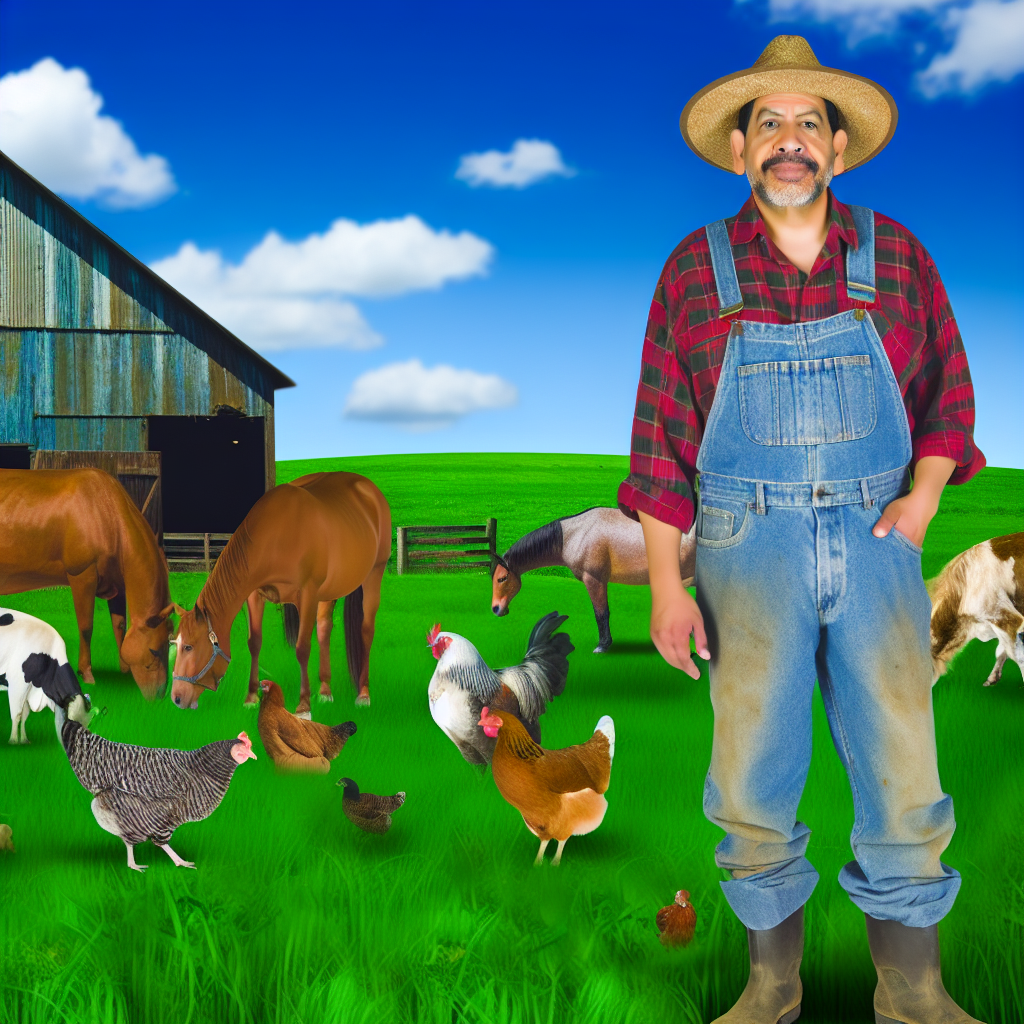Introduction to Organic Animal Farming: Principles and Benefits
Defining Organic Animal Farming
Organic animal farming focuses on the ethical treatment of animals.
It promotes systems that enhance animal welfare and environmental health.
Farmers use organic methods to raise livestock without synthetic chemicals.
This approach supports sustainable agricultural practices.
Core Principles of Organic Animal Farming
Animal health is paramount in organic farming.
Farmers emphasize natural behaviors in animal husbandry.
Organic systems ensure that animals have access to pasture.
In addition, organic feeds are free from GMOs and additives.
Understanding the Benefits
Organic farming yields numerous environmental benefits.
It improves biodiversity by creating healthier ecosystems.
Moreover, organic practices help reduce pollution and soil degradation.
Consumers also gain health benefits from organic products.
These products often contain fewer harmful residues from pesticides.
Contributing to Sustainable Practices
Organic animal farming supports sustainable agriculture as a whole.
It encourages responsible sourcing and resource management.
Transform Your Agribusiness
Unlock your farm's potential with expert advice tailored to your needs. Get actionable steps that drive real results.
Get StartedFarmers often blend traditional and innovative practices for improvement.
This holistic approach conserves natural resources for future generations.
Key Regulations and Certifications for Organic Animal Farming
Understanding Organic Certifications
Organic certifications ensure compliance with specific agricultural standards.
These certifications vary by country and organization.
The United States Department of Agriculture (USDA) provides a widely recognized certification.
Similarly, European Union regulations set stringent guidelines for organic practices.
Farmers must follow these guidelines to sell products as organic.
Importance of Compliance
Compliance is crucial for maintaining organic integrity.
It builds consumer trust in organic labels.
Moreover, non-compliance can lead to penalties and loss of certification.
Farmers must keep detailed records of all farming practices to demonstrate compliance.
Certifying Organizations
Various organizations handle organic certification across regions.
In the U.S., entities like Oregon Tilth and California Certified Organic Farmers (CCOF) are key players.
Meanwhile, in Europe, local bodies oversee organic certification in compliance with EU rules.
Farmers often choose certifying organizations based on reputation and specific needs.
Regulations Governing Organic Animal Welfare
Animal welfare is a significant focus in organic farming regulations.
Animals must have access to outdoor spaces and pasture.
Organic standards prohibit the use of harmful antibiotics and growth hormones.
Furthermore, farmers must provide organic feed free of synthetic substances.
Documentation and Record-Keeping
Thorough documentation is essential for organic certification.
Farmers should maintain records for at least three years.
Records must include purchase invoices, feed sources, and treatments administered.
Accurate documentation facilitates inspections and certification renewal.
Transitioning to Organic Practices
Transitioning to organic farming requires time and planning.
Showcase Your Farming Business
Publish your professional farming services profile on our blog for a one-time fee of $200 and reach a dedicated audience of farmers and agribusiness owners.
Publish Your ProfileFarmers often undergo a three-year transition period before achieving organic certification.
This period allows soil, plants, and animals to adapt to organic practices.
During this time, farmers should seek expert advice to ensure compliance.
Participating in workshops and training can provide valuable guidance.
Choosing the Right Breeds for Organic Animal Systems
Understanding the Importance of Breed Selection
Breed selection impacts the overall health and productivity of organic systems.
Moreover, each breed has unique characteristics suitable for different environments.
Choosing the right breeds ensures compliance with organic farming standards.
This choice also affects the farm’s economic viability over the long term.
Factors to Consider When Selecting Breeds
Begin by evaluating your farm’s environmental conditions.
For instance, consider factors like climate, soil type, and available resources.
Next, think about the purpose of the animals on your farm.
Furthermore, consider whether you’ll use them for milk, meat, or fiber production.
Additionally, assess breed resistance to local diseases and parasites.
Strong resistance helps minimize the need for chemical treatments.
Popular Breeds for Organic Farming
Many farmers successfully raise specific breeds tailored for organic systems.
For dairy farming, consider Jersey cows for their rich milk quality.
Moreover, Ayrshire and Guernsey breeds thrive in organic settings as well.
When it comes to meat production, look at heritage breeds like Berkshire pigs.
They are known for their excellent meat quality and adaptability.
Poultry breeds like Red Ranger chickens are also popular choices for organic farms.
Benefits of Using Heritage Breeds
Heritage breeds often exhibit greater resilience and adaptability.
Consequently, they can thrive in diverse farming conditions.
These breeds maintain genetic diversity, improving farm sustainability.
Additionally, they often have lower environmental impacts compared to commercial breeds.
Local Resources for Breed Selection
Connecting with local agricultural extension services can provide valuable insights.
Your local cooperative might also have recommendations on suitable breeds.
Many farmers share their experiences and results through community forums.
Utilizing these resources enhances your understanding of the best breed choices.
Learn More: Pricing Strategies for Direct Farm Sales
Organic Feed: Sourcing, Composition, and Nutritional Considerations
Importance of Organic Feed
Organic feed is crucial for animal health and welfare.
It provides essential nutrients that promote growth and productivity.
Moreover, organic feed supports sustainable farming practices.
Sourcing Organic Feed
Sourcing organic feed requires careful consideration.
Farmers should establish reliable relationships with suppliers.
They must ensure that feeds are certified organic by reputable organizations.
Consider local sources to reduce transportation impacts.
Additionally, farmers can grow some of their own feed ingredients.
This approach not only saves costs but also enhances sustainability.
Composition of Organic Feed
Understanding feed composition is essential for optimal nutrition.
Organic feeds typically comprise grains, legumes, and forages.
Showcase Your Farming Business
Publish your professional farming services profile on our blog for a one-time fee of $200 and reach a dedicated audience of farmers and agribusiness owners.
Publish Your ProfileThese ingredients must meet specific nutritional standards.
A balance of proteins, carbohydrates, fats, vitamins, and minerals is vital.
Farmers should analyze feed formulations regularly.
This practice helps to identify potential deficiencies or imbalances.
Nutritional Considerations
Nutritional needs vary based on animal species and age.
For example, young livestock require higher protein levels.
Conversely, mature animals may need different nutrient ratios.
Some farmers utilize nutritional supplements to enhance the diet.
Consulting with a livestock nutritionist can provide valuable insights.
Additionally, farmers should monitor animal performance regularly.
This monitoring helps adjust rations as necessary.
Challenges in Organic Feed Management
Managing organic feed has its own set of challenges.
Availability of organic materials can fluctuate seasonally.
This variability may impact production consistency.
Farmers may also face higher costs compared to conventional feeds.
Yet, understanding these challenges can lead to better planning.
Benefits of Organic Feeding Practices
Organic feeding practices yield numerous benefits for farmers.
They enhance the quality of animal products.
Additionally, they contribute to healthier ecosystems.
Farmers practicing organic feeding often attract niche markets.
This can lead to improved profitability and customer loyalty.
See Related Content: Enhancing Yield in Community Supported Agriculture Farms
Animal Health Management in Organic Systems
Understanding Animal Health in Organic Farming
Animal health is a cornerstone of organic farming practices.
Healthy animals contribute to sustainable production systems.
Additionally, they help in maintaining farm ecology.
Farmers must prioritize preventive care and management.
Preventive Health Practices
Preventive care encompasses various approaches in organic farming.
Regular health assessments are essential for all animals.
Farmers should also maintain a clean and safe environment.
Nutritional health plays a vital role in disease prevention.
Using organic feed enhances overall animal wellness.
Vaccination Protocols
Vaccination is crucial in an organic farming system.
Organically approved vaccines help minimize disease outbreaks.
Consulting with veterinarians ensures compliance with organic standards.
Farmers must develop a vaccination schedule tailored to their needs.
Record-keeping of vaccinations is essential for health audits.
Monitoring Animal Behavior
Observing animal behavior can indicate health issues early.
Changes in eating habits may signal illness.
Farmers should monitor activity levels and social interactions.
A prompt response to behavioral changes can save lives.
Showcase Your Farming Business
Publish your professional farming services profile on our blog for a one-time fee of $200 and reach a dedicated audience of farmers and agribusiness owners.
Publish Your ProfileHolistic Treatment Approaches
Holistic treatments focus on the overall well-being of animals.
Natural remedies can be integrated into health management.
Homeopathy and herbal treatments offer alternatives to conventional drugs.
Farmers must ensure that all treatments comply with organic regulations.
Collaboration with Veterinarians
Building relationships with veterinarians enhances farm health strategies.
Regular consultations provide insights into best practices.
Veterinarians can assist with developing effective treatment protocols.
Furthermore, they can help in navigating organic compliance.
Documentation and Record-Keeping
Proper documentation is vital for animal health management.
Each animal’s health status should be recorded meticulously.
Farmers need to maintain detailed treatment records.
This practice aids in tracking health trends over time.
Accurate records facilitate audits and organic certification processes.
Gain More Insights: Optimizing Your Farm’s Online Store for Sales

Sustainable Housing Solutions for Organic Livestock
Importance of Sustainable Housing
Sustainable housing is crucial for organic livestock farming.
It promotes animal welfare and reduces stress levels.
Additionally, sustainable designs enhance productivity and health.
Such structures minimize environmental impacts significantly.
Key Features of Sustainable Livestock Housing
Efficient ventilation systems are essential for livestock housing.
These systems maintain a comfortable climate for the animals.
Natural lighting is another key feature of effective housing.
It creates a pleasant environment and supports animal health.
Furthermore, using eco-friendly materials helps reduce waste.
Solar panels can provide renewable energy sources.
Design Considerations for Organic Farms
Location plays a significant role in housing design.
Consider the natural landscape to optimize animal movement.
Design flexible spaces for different livestock needs.
Integrating pasture access enhances animal welfare.
Ensuring proper drainage protects against environmental issues.
Finally, prioritize sustainable practices during construction.
Alternative Housing Techniques
Rotational grazing systems benefit both livestock and land.
They promote soil health and reduce overgrazing risks.
Mobile housing units provide flexibility across pastures.
These units enable farmers to adapt to changing conditions.
Furthermore, green roofs can assist with insulation.
Implementing Sustainable Solutions
First, assess specific needs of the livestock.
Secondly, involve stakeholders in the planning process.
Collaboration can yield innovative solutions for housing.
Lastly, adapt and learn from other successful farms.
Gain More Insights: Enhancing Student Nutrition Through Farm-to-School
Showcase Your Farming Business
Publish your professional farming services profile on our blog for a one-time fee of $200 and reach a dedicated audience of farmers and agribusiness owners.
Publish Your ProfileIntegrating Crop and Animal Farming
Advantages of Integration
Integrating crop and animal farming creates diverse ecosystems.
This diversity improves soil fertility and promotes healthy plant growth.
Moreover, animals provide natural fertilizers through their waste.
This practice reduces the need for synthetic fertilizers and chemicals.
Additionally, crop residues can serve as feed for livestock.
By recycling nutrients, farmers can reduce waste and enhance productivity.
Economic Benefits
A holistic approach offers significant economic advantages.
It lowers input costs and increases overall farm profitability.
Farmers can diversify their income streams through diversified products.
For instance, producers can sell meat, dairy, and crops simultaneously.
Ultimately, this diversification helps shield farmers from market fluctuations.
Environmental Impact
Integrating crop and animal farming positively impacts the environment.
This method promotes sustainable land use and conserves resources.
It enhances biodiversity, supporting a wide range of species.
Furthermore, integrated systems often require less water and energy.
Consequently, these practices contribute to mitigating climate change effects.
Community and Social Benefits
Holistic approaches foster community resilience and food security.
They encourage local food systems and strengthen connections among farmers.
By working together, farmers can share knowledge and resources.
Additionally, this collaboration leads to better community support systems.
Social harmony grows as communities engage in sustainable practices.
Challenges to Integration
While benefits exist, challenges can hinder integration efforts.
Access to knowledge and resources is often limited for many farmers.
Some may lack financial support for necessary infrastructure investments.
Moreover, climate variability can add to the unpredictability of results.
Addressing these challenges requires supportive policies and education.
Market Trends and Consumer Demand for Organic Animal Products
Growing Consumer Awareness
Consumers are becoming more aware of food sources.
They seek healthier and sustainably sourced products.
This awareness drives the market for organic animal farming.
Increased Demand for Organic Products
Organic animal products see a significant demand increase.
People prefer organic meat, dairy, and eggs over conventional options.
Reports show organic meat sales rose by 15% last year.
Health Consciousness Among Consumers
Many consumers link organic products to health benefits.
They believe these products have fewer chemicals and additives.
This perception fuels the demand for organic animal products.
Sustainability and Ethical Considerations
Consumers value sustainable and ethical farming practices.
They prefer animals raised in humane and natural conditions.
Such practices contribute to a more sustainable food system.
Market Accessibility and Availability
Retailers increasingly stock organic animal products.
Online platforms also make these products more accessible.
Showcase Your Farming Business
Publish your professional farming services profile on our blog for a one-time fee of $200 and reach a dedicated audience of farmers and agribusiness owners.
Publish Your ProfileConsequently, consumers enjoy greater convenience in purchasing.
Impact of Social Media and Influencers
Social media promotes awareness of organic farming benefits.
Influencers advocate for ethical and health-conscious choices.
This trend significantly influences consumer purchasing decisions.
Price Sensitivity and Economic Factors
Price often affects choices between organic and conventional products.
Consumers occasionally hesitate due to higher costs of organic options.
However, many prioritize quality over price in their purchasing decisions.
Additional Resources
Opinion | What Farm-to-Table Got Wrong – The New York Times
Farm to Table: Building Local and Regional Food Systems – SARE




